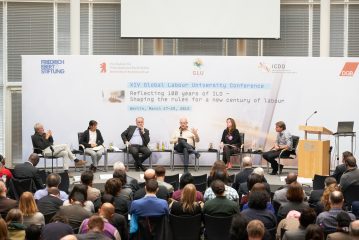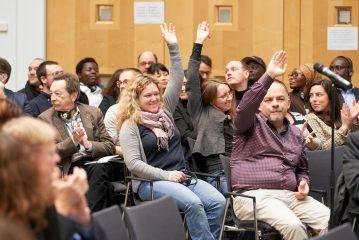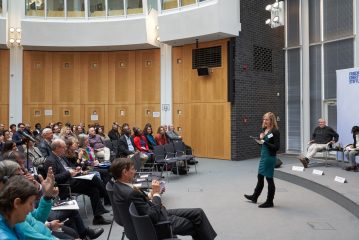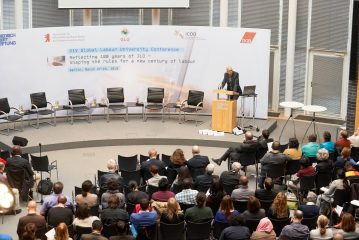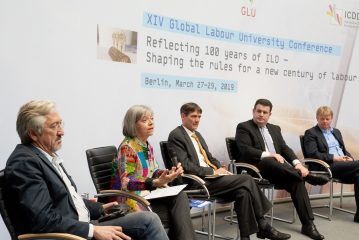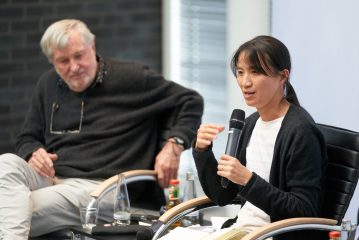XIII GLU CONFERENCE
The Future of Work - Democracy, Development and the Role of Labour
The current global conditions of rising conservative forces, the spectre of unemployment and the precarisation of work, due to technological change and global restructuring processes, pose enormous challenges to academics, unionists and social organizations concerned with the future of work, democracy and less asymmetrical development.
about the conference
Background:
The last four decades have been marked by neoliberal hegemony and intensification in the process of globalization and financialization, which are presented as the main components of world economic order. Unregulated global capitalism has led to instability and deep financial and productive crises, resulting in high unemployment and an increase of inequality, informalization and precariousness of labor.
The implementation of successive structural reforms have contributed to the reduction of social protection and labor regulation, weakening the role of trade unions and hampering their struggles and strategies of organization - nationally and internationally - widening social inequality within nations and asymmetries between nations in economic development, insertion in the global value chains and in the international division of labour. Furthermore, the international agenda of our times is marked by the growth of right-wing and extreme right-wing forces in several nations. Also the profound ongoing technological changes create concerns about the future of labor, the organization and role of trade unions, public labour regulation, on the possibilities for reducing global asymmetries in global value chains and in the international division of labour.
The XIII GLU Conference will debate these challenges with a focus on four sub-themes:
1. Structural Changes and Impacts on Labour
2. Trade Union Organization and Strategies
3. Labour Regulation
4. Development
Event Facts
XIII GLU CONFERENCE
Download Info Materials
Download the call for papers
Download the invitation for trade unionists here
Booklet for participants
Download the overview of conference programme
Download the full version of conference programme
Download the conference timetable
XIV GLU CONFERENCE
Reflecting 100 years of ILO – Shaping the rules for a new century of labour?
The International Labour Organization (ILO) is celebrating its first 100 years at a time when labour is under massive attack. On the one hand, business and governments are pushing for new trade and investment agreements that provide for more rights for corporations at the expense of citizens as workers, consumers and at times at the cost of natural environment. On the other hand, an increasing number of governments are violating workers’ rights, curtailing some of the hard-won social gains by authoritarian means and undermining democratic principles. As governments hold half of the votes in the ILO and capital another quarter, labour is also on the defensive within the ILO.
about the conference
Background:
Without the ILO setting international labour rights and standards for 100 years, the conditions for labour would undoubtedly look worse today. However, labour faces a double challenge. Defensively, global and national rules curtailing its rights as well as the threat of erosion of the ILO as a rights-based and standardsetting organisation need to be fought. Offensively, the changing world of work with automation and digital technology needs new rules and enforcement mechanisms to defend and create decent working and living conditions, democratic societies as well as a sustainable future for the planet.
Against this background, the Global Labour University (GLU) wants to invite labour activists and academics to contribute to the global discourse on what kinds of new global rules are necessary, what role the ILO is expected to play in a system of global governance, and how we can strengthen international labour solidarity to obtain the rules needed.
Under the general theme Reflecting 100 years of ILO – Shaping the rules for a new century of labour the XIV GLU Conference will debate these challenges with a focus on five sub-themes:
1. Instruments for Strengthening Global Labour
2. Representation of Informally or Precariously Employed Workers
3. Trade and Investment Regimes
4. Economic and Social Upgrading in Global Value Chains
5. Just Transition
Event Facts
XIV GLU CONFERENCE
Download Info Materials
Download the full conference programme
Download the call for papers
Information for participants
Visit the website for conference impression
XV GLU CONFERENCE
Building a Post-Pandemic World of Work with Social Justice
The Covid-19 pandemic, digitalization, climate change, right-wing populism, and rising authoritarianism have changed the world of work.
In this 2022 edition of the GLU-Conference hosted by Penn State University, AFL-CIO, International Center for Development and Decent Work (ICDD) and Friedrich-Ebert-Stiftung (FES), we analyze these developments and ask how we build anew our workplaces and societies based on social justice.
Background:
In GLU’s unique blend of academic work and trade union activism, we offer discussions in 7 tracks on inclusive social protection; ending gender-based violence and racism at work; worker organizing for a just transition; organizing workers in and across the platform economy; empowering migrant workers; workers' rights under rising authoritarianism; global supply chains and collaboration of academics and trade unionists
Virtual Event:
The conference will take place via Zoom and in English without translation. So, please download and install the newest Zoom client on your computer or mobile device (www.zoom.us/download). Remember that you will need a stable internet connection so that you can take part without interruptions. The Plenary Sessions on March 30 and April 5 will also be recorded and available via a public LIVESTREAM on this website.
With any technical problems or further questions please contact our helpdesk which will be activated a few days before the event.
Registration:
To participate in the conference it is mandatory to follow the two-step process, which includes registering for the conference and creating an account at MyFES.de. The Zoom links and the corresponding dial-in data/passwords for the conference will be shared in the Programme and Breakout Sessions sections of this website in good time.
You must be logged in at your MyFES-account to access the information and we will inform you as soon it becomes available.
Event Facts
XV GLU CONFERENCE
necessary to participate in online meetings
www.zoom.us/download
Online service by the Friedrich Ebert Stiftung for registration
www.fes.de/en/my-fes/registration
Download the Conference Programm here
With any technical problems or further questions please contact our helpdesk which will be activated a few days prior to the event.
Here you can read the full summary of the XV GLU conference.


